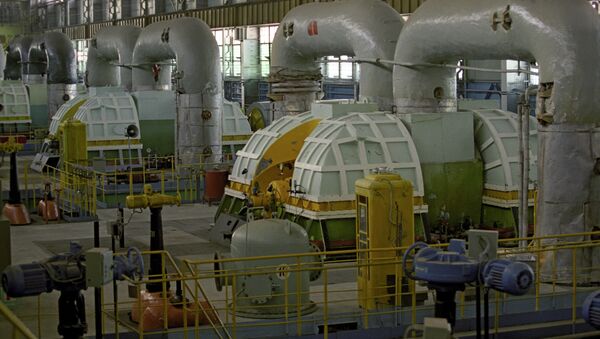MOSCOW, November 21 (Sputnik), Alexander Mosesov — Although Russia has completed a notable amount of initiatives to liquidate its nuclear legacy, there is still much to be done by the country, an official from Rostechnadzor, the agency with Russia's nuclear safety among its responsibilities, told Sputnik Friday.
"We have managed to do a lot. Several dozens of nuclear legacy objects are already decommissioned. But there is still a lot of work to be done, because more than 100 objects as of today are shut down and they should be prepared for decommissioning… There are several thousands of such objects," Yevgeny Kudryavtsev, the head of Rostechnadzor's department for safety regulation of nuclear fuel cycle facilities, nuclear power installations of vessels and radiation hazardous facilities, told Sputnik in an interview.
"Therefore, the government has decided to extend the program on ensuring nuclear and radiation safety in Russia, at first till 2025, according to the latest data — until 2030," the department head added.
Kudryavtsev, who participated in the Moscow International Workshop on Regulatory Control on Nuclear Legacy Sites and Radioactive Waste Management, said the agency's work began "in 2008, when the federal program came into effect ensuring nuclear and radiation safety for the period from 2008 to 2015. As part of this program more than 130 billion rubles [$2.8 billion] has been allocated to tackle priorities that include the field of nuclear legacy."
"The issue was suspended. Safety was maintained [on the objects] but no one was engaged in liquidation, decommissioning," Kudryavtsev said, explaining the situation before 2008.
US, UK, FRANCE
Besides Russia, the United States, the United Kingdom and France are among the countries facing serious issues surrounding the liquidation of their nuclear legacies, the official said.
"The largest nuclear legacy is in those countries which have been developing and testing nuclear weapons, being involved in the arms race," Kudryavtsev told Sputnik.
The United States, USSR, United Kingdom and France were the first four countries to develop nuclear weapons, having tested them in 1945, 1949, 1952 and 1960 respectively.
As for the United States, Kudryavtsev said that the country has "been engaged with its program for approximately 25 years, has spent much more than $100 billion on eliminating its nuclear legacy and has eliminated … about 75 percent of its nuclear legacy. It plans to finish [its work] by 2050 with a huge complex being built for processing of nuclear waste at the Hanford site."
The United Kingdom, according to the department head, "also has serious problems. They also provide substantial amounts, several billion pounds a year to eliminate their nuclear legacy. In fact, they took a long time to prepare the plans for nuclear legacy elimination."
"The French, too, are actively working to eliminate their nuclear legacy in Marcoule, where they had received their first weapons-grade plutonium. … They also provide large enough sums, but compared with the United States, United Kingdom and Russia, the scope of the problems in France is much smaller," Kudryavtsev concluded.
The International Workshop on Regulatory Control on Nuclear Legacy Sites and Radioactive Waste Management under the aegis of IAEA took place in Moscow on November 19-21. It is mainly devoted to the regulatory aspects of decommissioning and rehabilitation of uranium mining facilities as well as other radioactive waste management and control issues. Russia's Rostechnadzor hosted the workshop with the involvement of specialists from the country's Federal Medical and Biological Agency.


